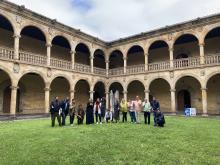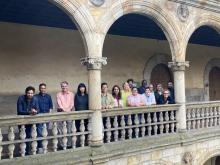The Socio-Politics of Legal Design and their Epistemic Consequences
Coordinators: Siddharth Peter de Souza (Tilburg Law School), Joaquín Santuber (Universidad de Los Andes, Colombia)
Description of the meeting
Our workshop aims to bring together researchers who are working in the field of Law, Justice, and Design to interrogate the emergence of vocabularies of the emergent field and unpack their epistemic consequences.
Legal design has emerged in the last decade as an interdisciplinary practice, at the intersection of law and justice, and human-centred design. Legal design research and practice focus on new forms of legal products and service delivery, as well as engaging with legal systems as a whole. However, while a refreshed perspective on design is welcomed, there is often the uncritical pursuit of innovation which has led to its application without examining its socio-political consequences.
Despite the short history of legal design as a discipline, its foundations in human-centred design have been questioned urging for an “expanded practice of inquiry”. Justifying all sorts of innovation in the universal needs of users is even more problematic for human-centred design due to its large adoption in industry and the public sector. This has turned “the human” into a marketable being, often referred to as the user. Where traditionally there was a citizen, now there is a user. Placing a market type of human at the centre for the design activity justifies the reproduction of systems by placing the spark or inspiration for new products and services in the human-user-consumer. In the field of law and justice, and in politics and democracy the unquestioned adoption of human-centred design approaches is even more problematic. The adoption of such practices in policy and legal design has served as a trojan horse to impose the market values over those of democracy, justice, and equality.
An alternative has been proposed at the intersection of critical design approaches and socio-legal studies. Moreover, socio-legal studies have also leveraged design notions and tools. Through these conversations, we are also seeing legal design being part of a longer tradition of studies at the intersection of law and society, which advocate from bridging the gap between law in books and law in action. In this workshop we will critically address issues of epistemic injustice in the designing of legal services and systems, bringing together the tradition of socio-legal studies in dialogue with new concepts and frameworks from critical design approaches.
Our experience in Oñati
Thank you for the opportunity to host our workshop “The Sociopolitics of Legal Design and their Epistemic Consequences”. Plurality was one of the key concepts discussed during the two and a half days. This is reflected in the composition of this interdisciplinary group of both scholars and practitioners coming from the fields of law, sociology, design, engineering, and the arts convened in Oñati. Moreover, participants made their way to the Basque Country from Asia, North and South America, Africa, and Europe; ranging from Law School students, PhD students, young researchers, to senior scholars.
In this context, we addressed the plurality of ways of designing for the law and justice (aka legal designing), around the key commitment that legal designing opens up possibilities of knowing and doing to facilitate the changes our legal systems need. Specifically, on the first day we discussed designing as an affirmative and transformative approach, designing for human, people, more-than, and the scale and vocabularies of legal designing. On the second day, we engaged with designing legal education for social transformation, designing digital technologies to fit legal purposes, and designing democracy and participation.
The space in Oñati is fantastic: the town, the institute, and the residence. The town is walkable in any direction (everything is three minutes away in Oñati) which gives the feeling of being in a retreat. The institute’s building is monumental and historical, yet the rooms are well equipped with technological means providing a fantastic venue to discuss contemporary topics on critical legal sociology in a place full of history. The residence was the cherry on top for this whole experience.
The support from the Institute’s staff made the process of organizing and coordinating easier. Their attitudes towards providing solutions for different issues was always positive and made both the organizers and the participants comfortable with asking questions. This created an atmosphere in which everybody felt welcome, eager to participate in the discussions and take part in the social gatherings.
We will come back!
Joaquín and Siddharth
Workshop Coordination Team
Avenida de la Universidad, 8
Apartado 28
20560 Oñati (Gipuzkoa) - Spain
T: +34 943 78... Ver teléfono
E: workshop@iisj.es





